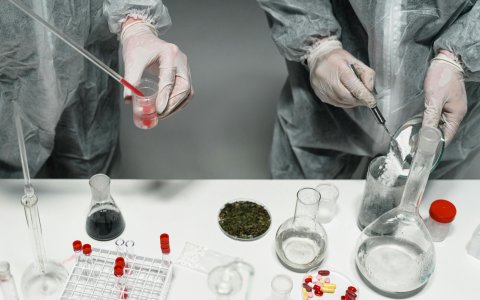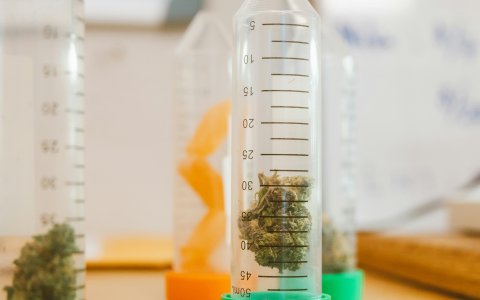
A Scientific Approach to Mental Well-being: The Role of the Endocannabinoid System
Introduction
The increasing prevalence of stress-related and affective disorders in modern society has catalyzed a search for novel therapeutic and supplemental strategies. While conventional treatments are foundational, there is a growing scientific interest in neuromodulatory compounds that can support the body's intrinsic homeostatic mechanisms. At Clarity, we operate at the intersection of phytochemistry and neuroscience, dedicated to exploring the therapeutic potential of cannabinoids for mental well-being.
The Endocannabinoid System: The Body's Master Regulator
Central to our work is the endocannabinoid system (ECS), a complex and ubiquitous cell-signaling network. The ECS is a primary homeostatic regulator, playing a crucial role in modulating a vast range of physiological processes, including mood, stress response, memory, sleep, and neuroinflammation. It comprises endocannabinoids (like anandamide), cannabinoid receptors (primarily CB1 and CB2), and the enzymes that synthesize and degrade them. When the ECS is dysregulated or deficient—a state some researchers term "Clinical Endocannabinoid Deficiency"—it can contribute to the pathophysiology of various conditions, including anxiety and mood disorders.
Our Mechanism of Action: Modulating the ECS with Cannabidiol (CBD)
Our formulations are centered on cannabidiol (CBD), a non-psychotropic phytocannabinoid derived from the Cannabis sativa L. plant. Unlike the psychoactive compound THC, CBD exhibits a low binding affinity for CB1 and CB2 receptors. Instead, its primary mechanism of action is indirect. Emerging research suggests CBD exerts its effects through several pathways:

Inhibition of FAAH
CBD inhibits the Fatty Acid Amide Hydrolase (FAAH) enzyme, which is responsible for the degradation of the endocannabinoid anandamide. By slowing anandamide's breakdown, CBD can increase its circulating levels, enhancing the body's natural "bliss molecule" and promoting a state of calm and well-being.
Serotonin Receptor Agonism
CBD has been shown to act as an agonist at the serotonin 5-HT1A receptor. This receptor subtype is a key target for many anxiolytic and antidepressant medications. By directly activating these receptors, CBD may help modulate serotonin signaling, which is critical for mood regulation and anxiety control.
Allosteric Modulation
CBD can also act as an allosteric modulator of other receptor systems, meaning it can change how these receptors respond to other signaling molecules, further contributing to a balanced neurological state.
Our Commitment to Scientific Rigor and Purity
A potential mechanism is only as valuable as the purity and bioavailability of the active compound. Clarity is founded on an unwavering commitment to empirical data and verifiable quality.

Formulation Science
We employ advanced formulation techniques designed to maximize the bioavailability of our CBD, ensuring that our products deliver consistent and predictable results. This includes exploring novel delivery systems that protect the molecule from metabolic degradation.
Full-Spectrum Synergy
Where applicable, our products utilize full-spectrum extracts. This approach is based on the "entourage effect" theory, which posits that CBD's therapeutic effects are enhanced when it co-occurs with other cannabinoids (like CBG, CBN) and terpenes found naturally in the hemp plant.
Uncompromising Quality Control
Every batch of our hemp extract is subjected to rigorous third-party analysis. We provide a comprehensive Certificate of Analysis (CoA) for each product, transparently detailing its full cannabinoid and terpene profile, while also verifying its freedom from pesticides, heavy metals, solvents, and microbial contaminants.
Our objective is to provide a scientifically-vetted, safe, and reliable tool for individuals seeking to support their neurological health and enhance their resilience to the stressors of modern life. We believe in empowering our customers through education, transparency, and products that are a testament to the power of phytochemical science.